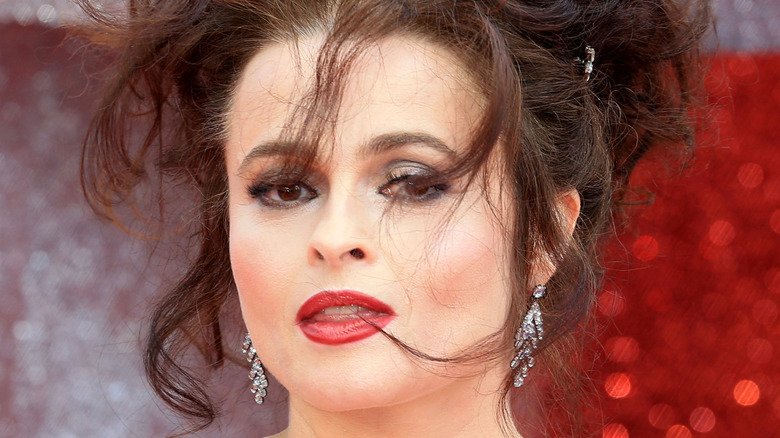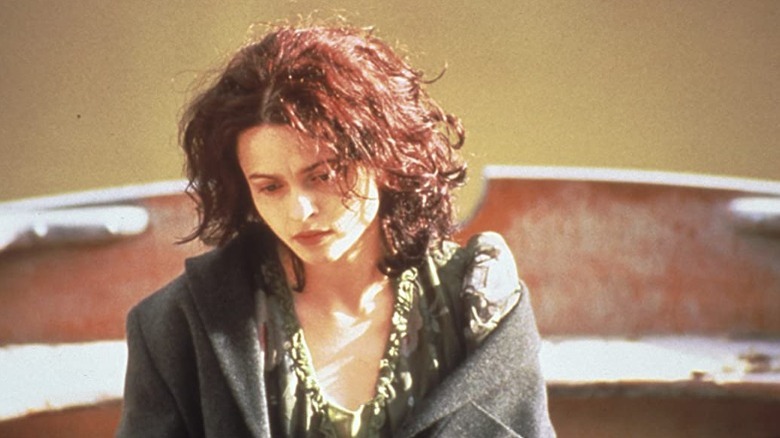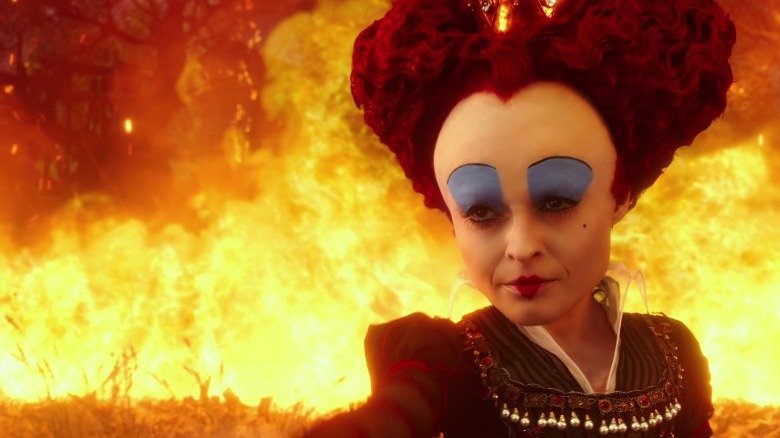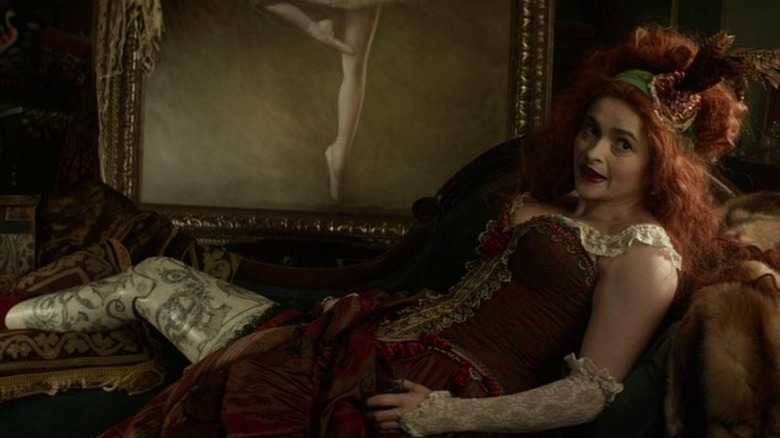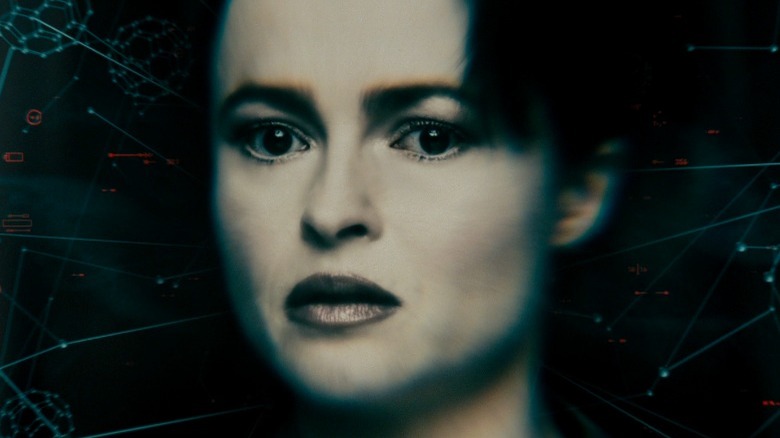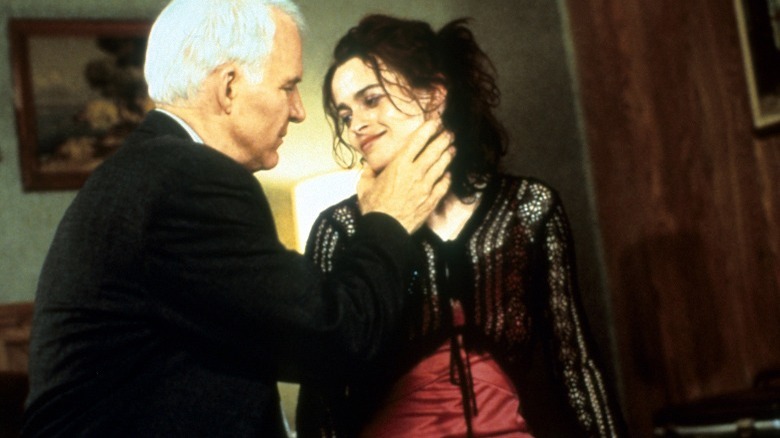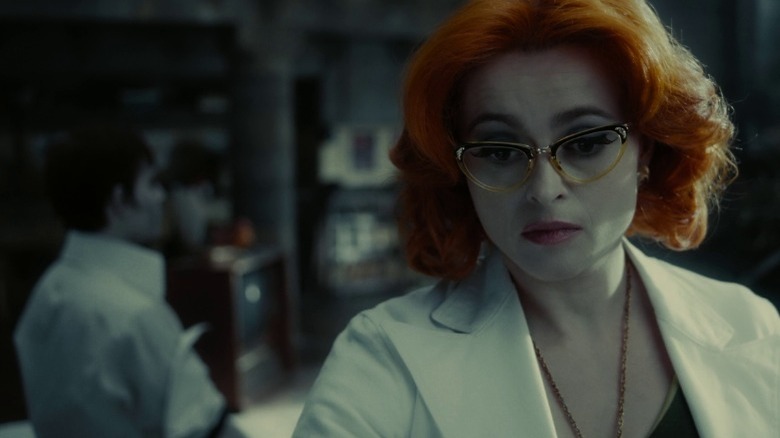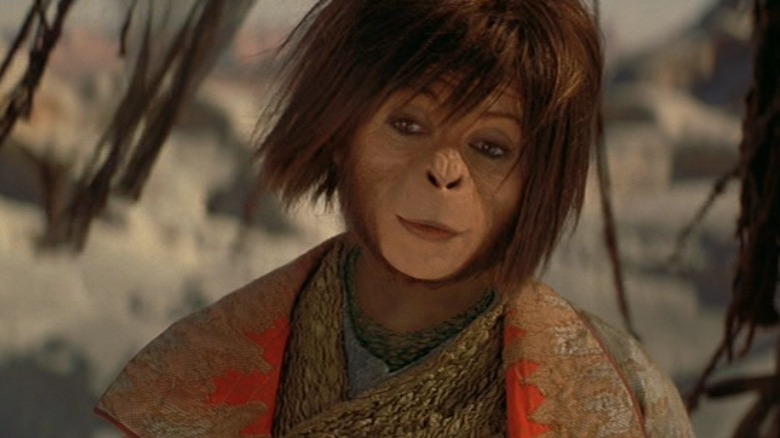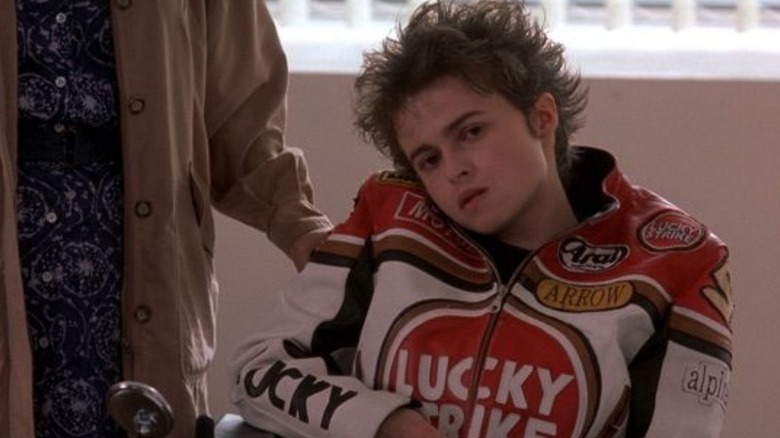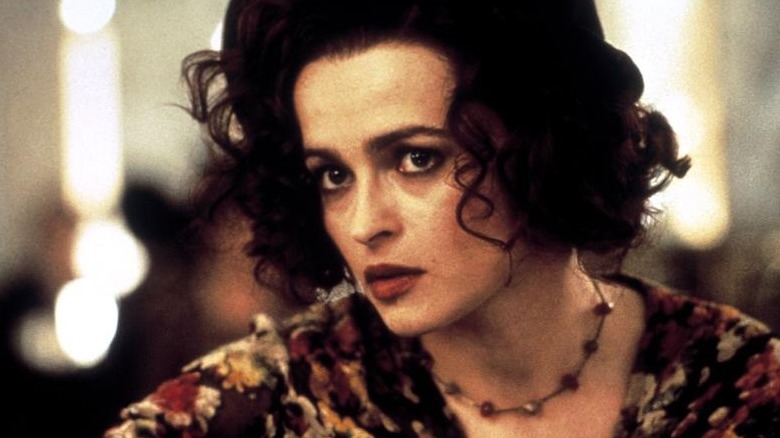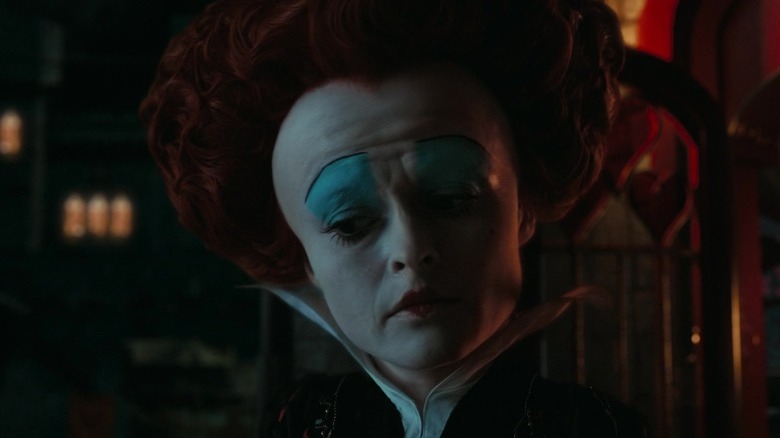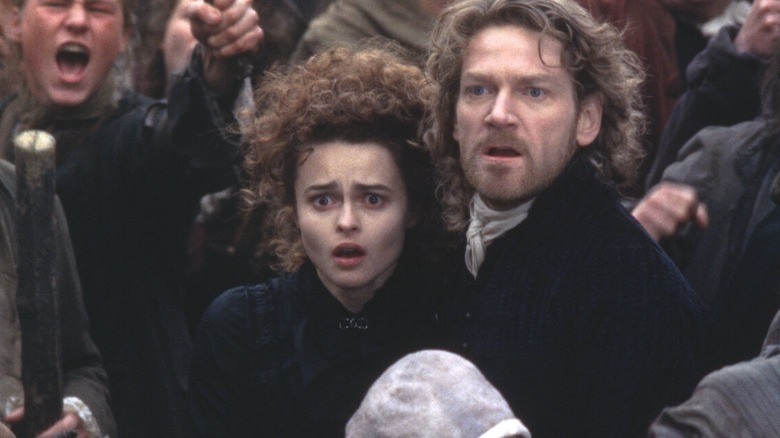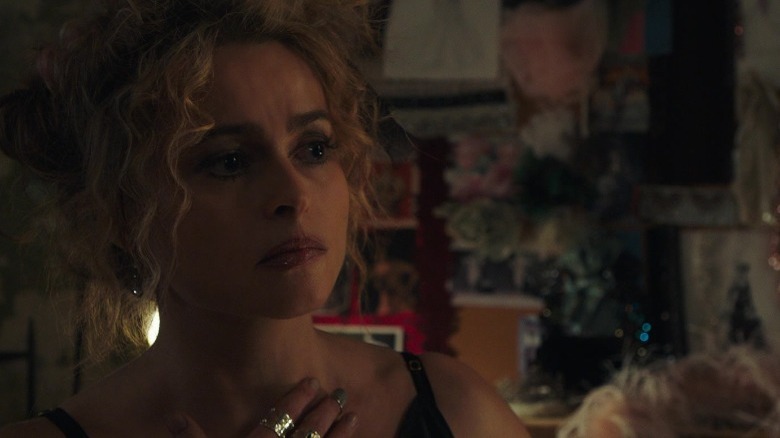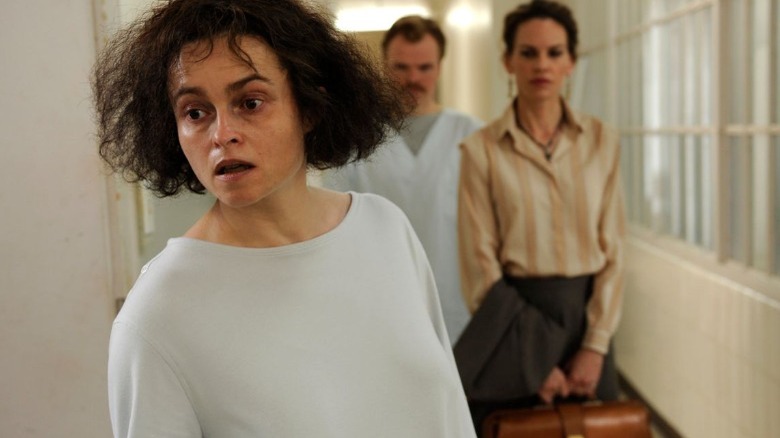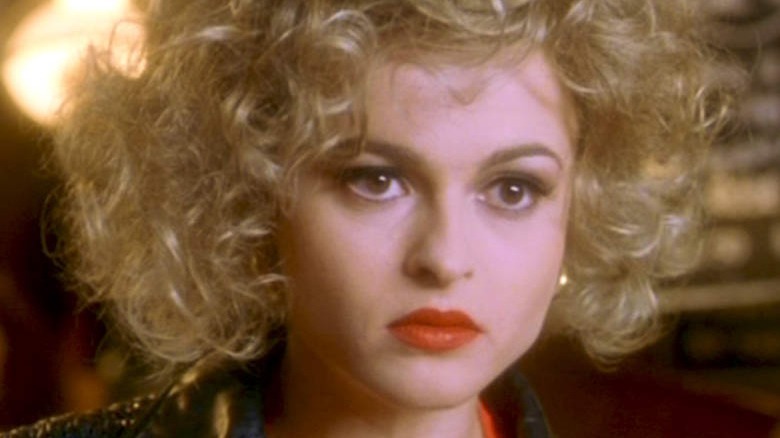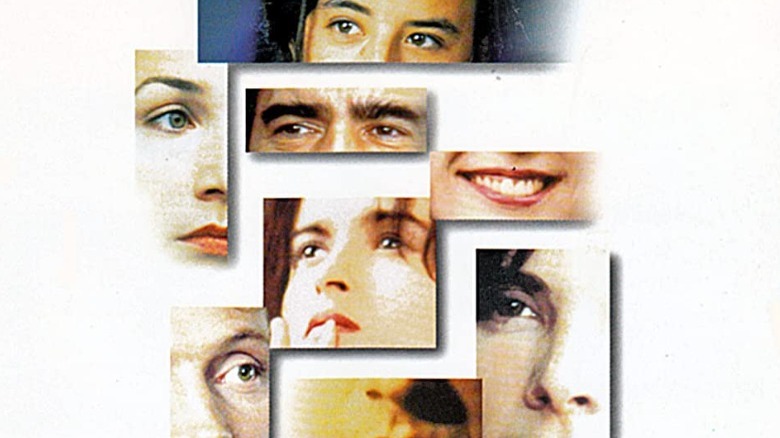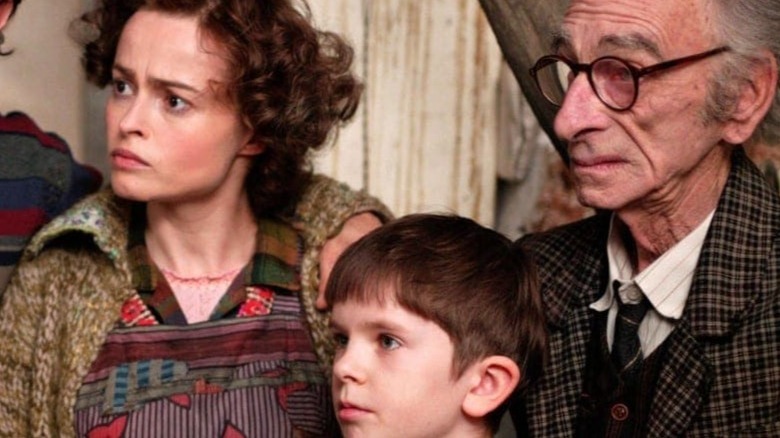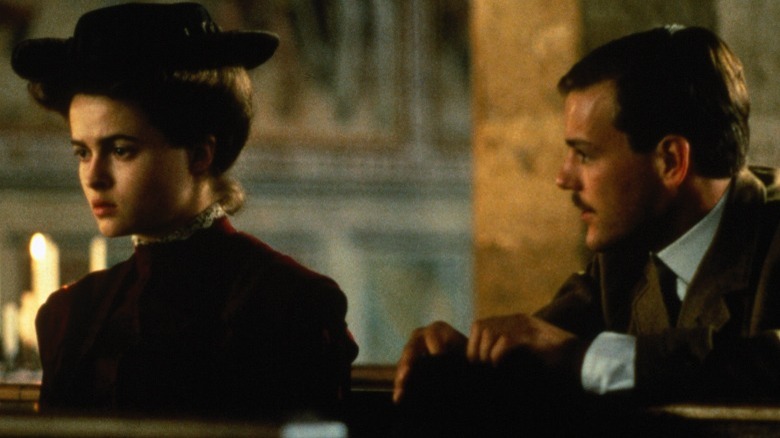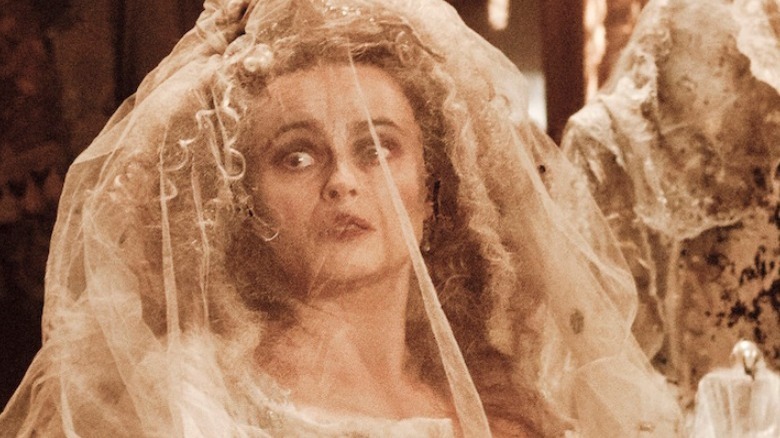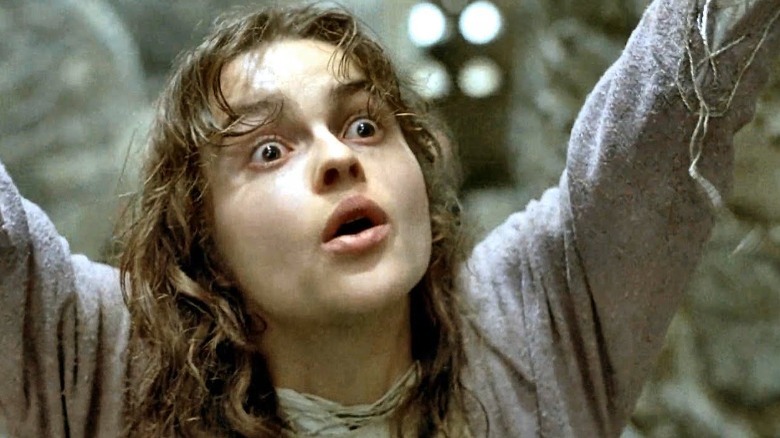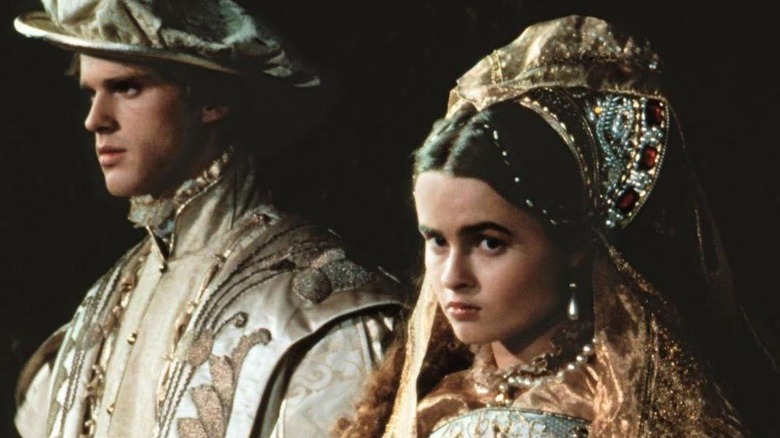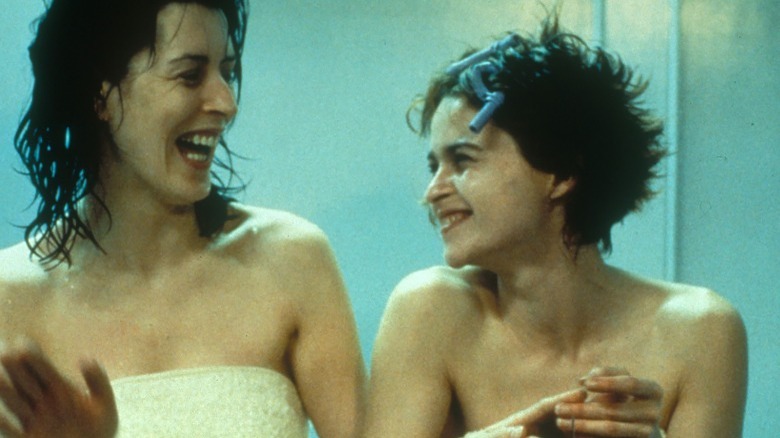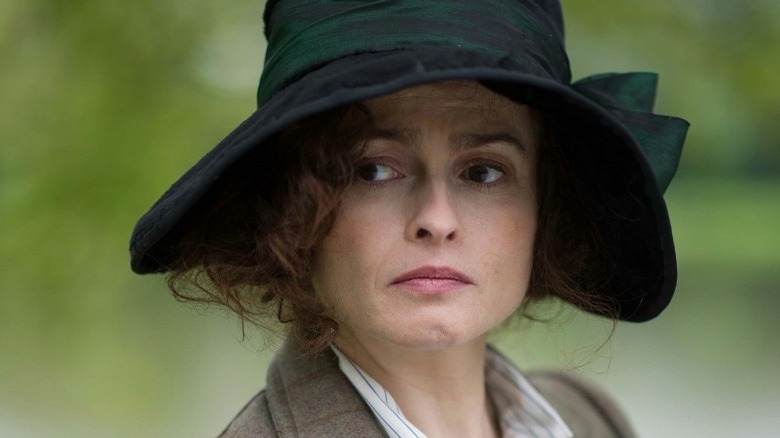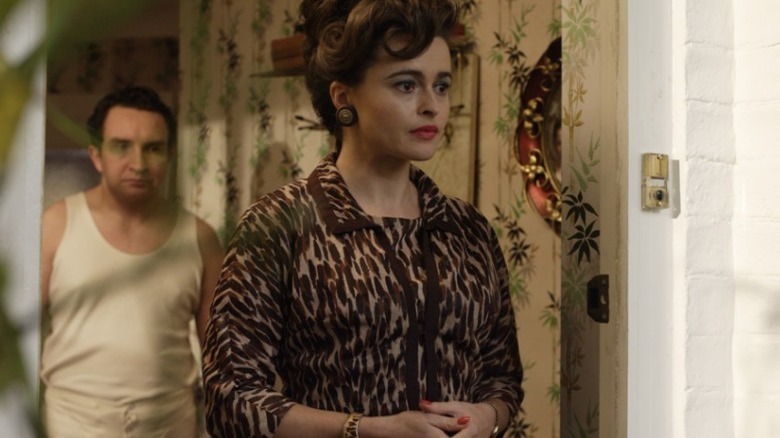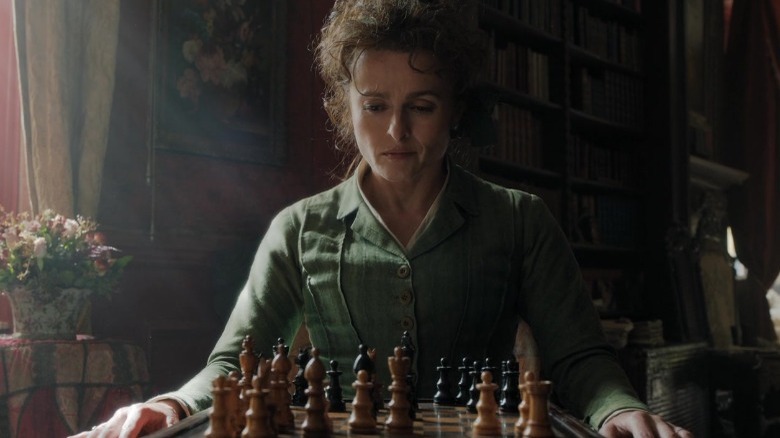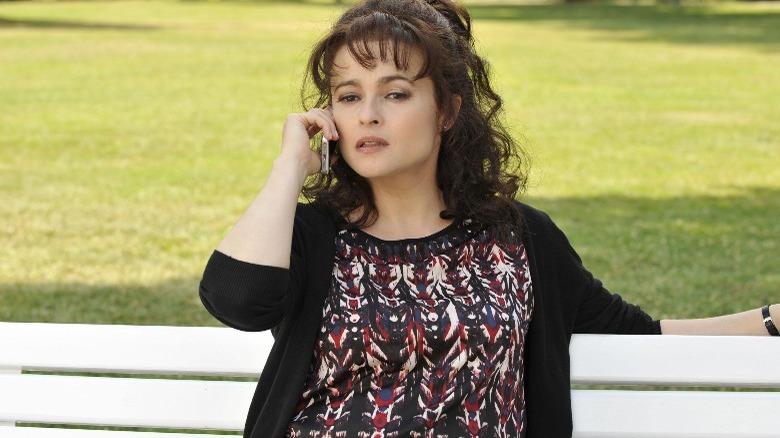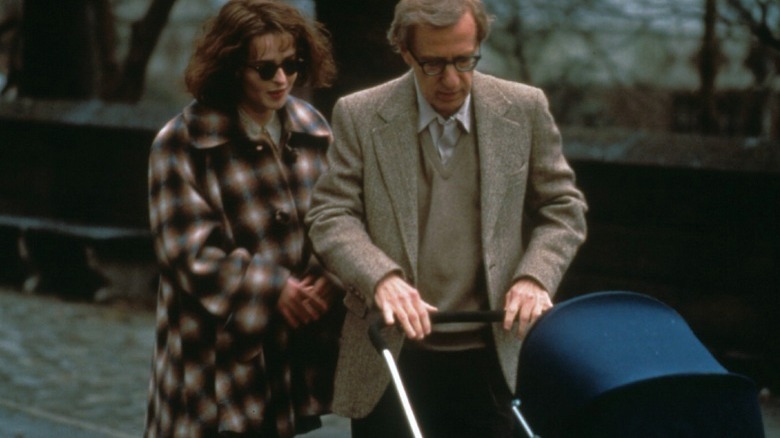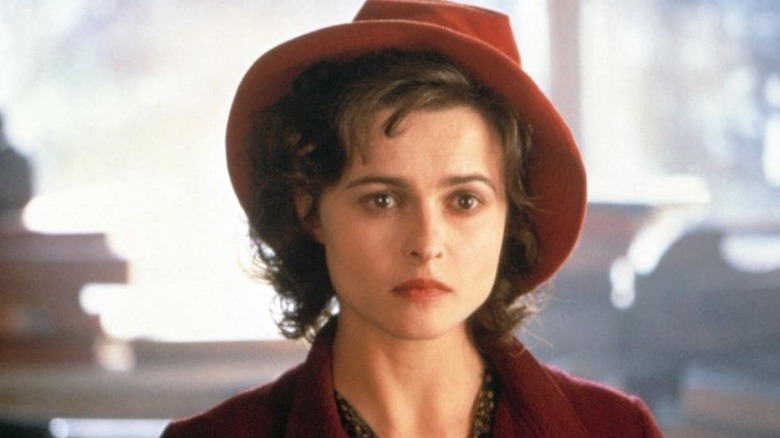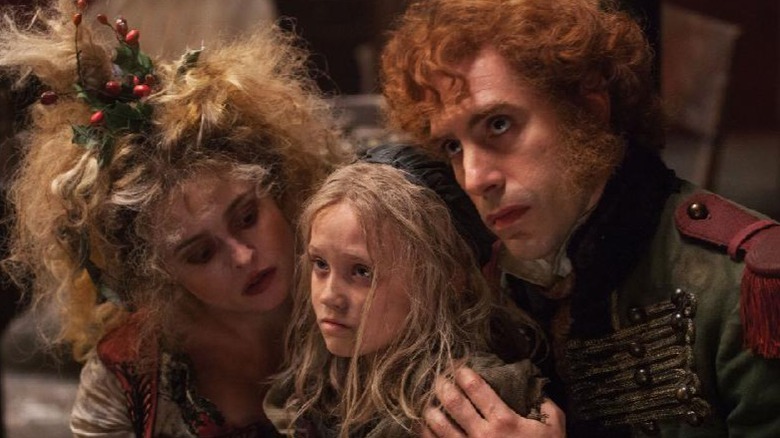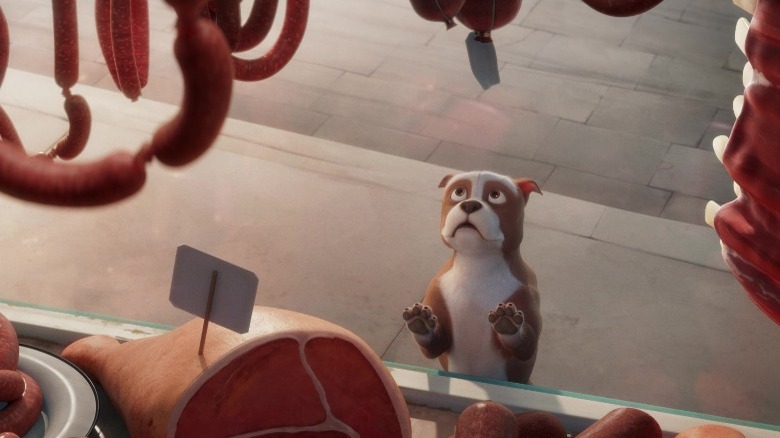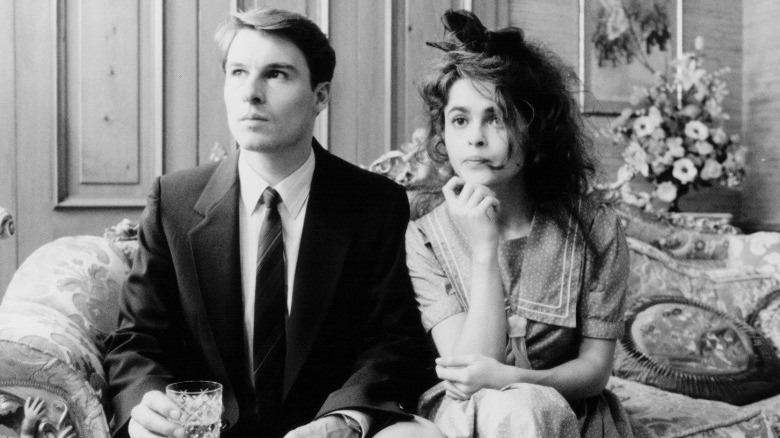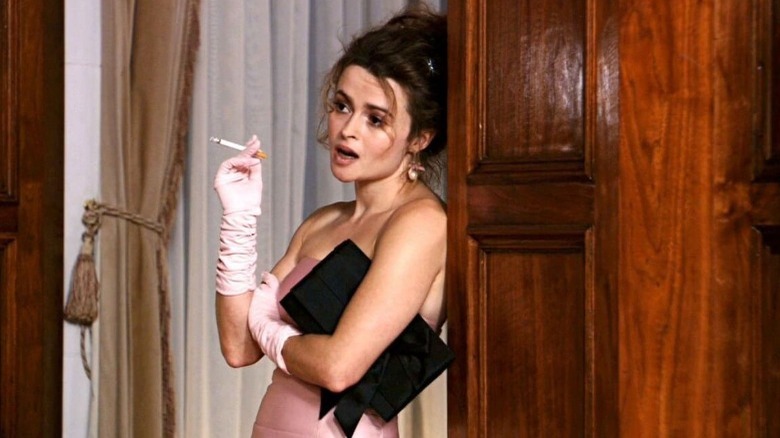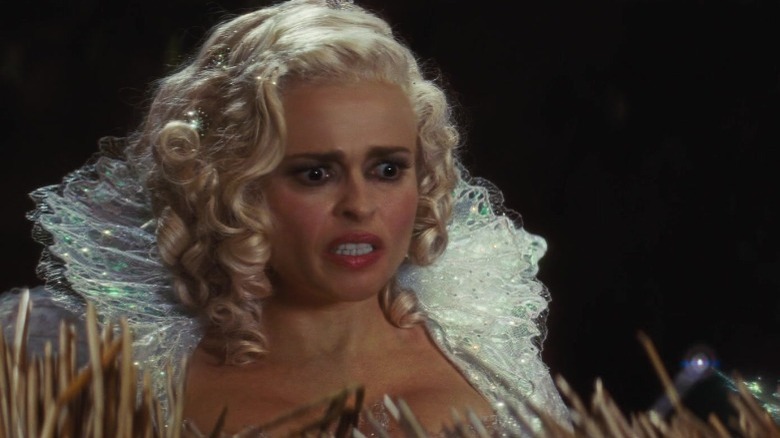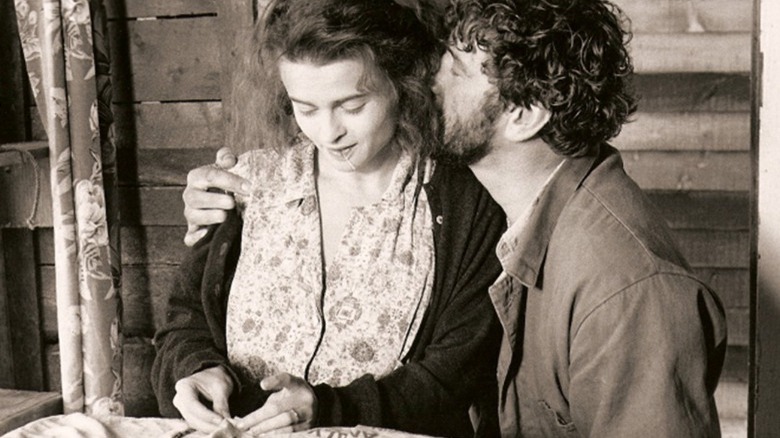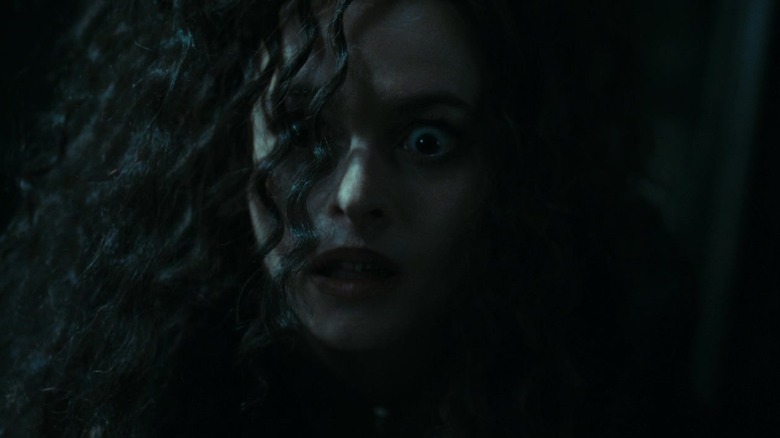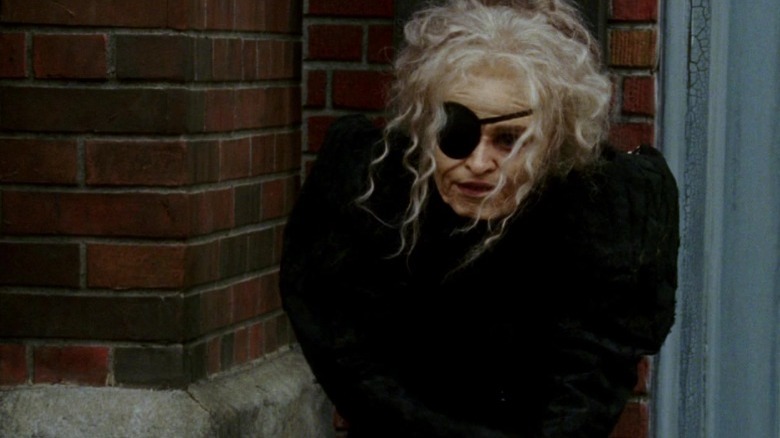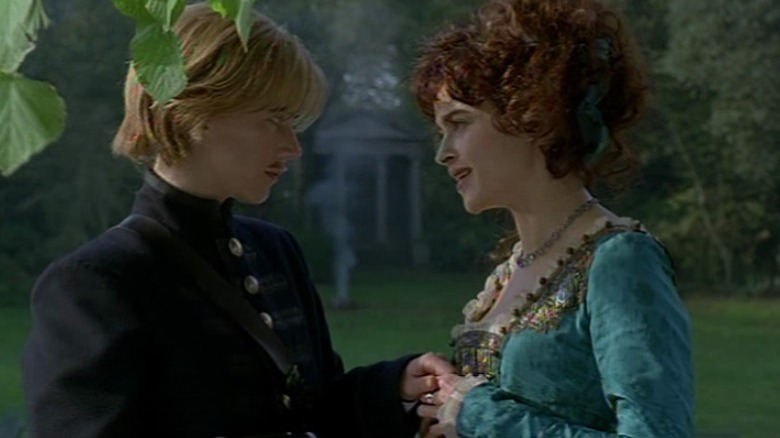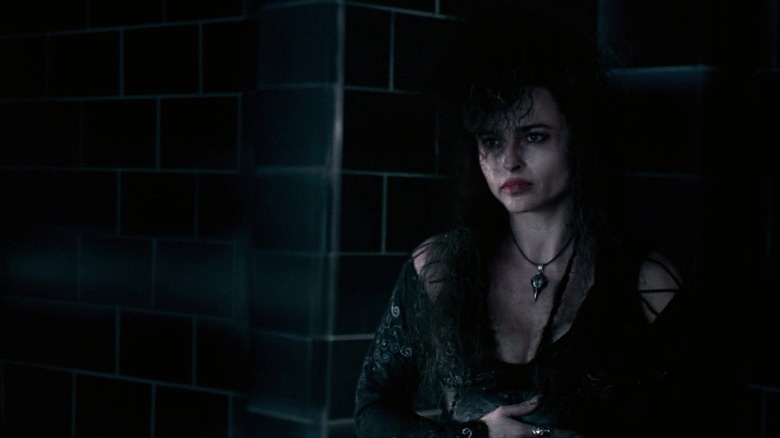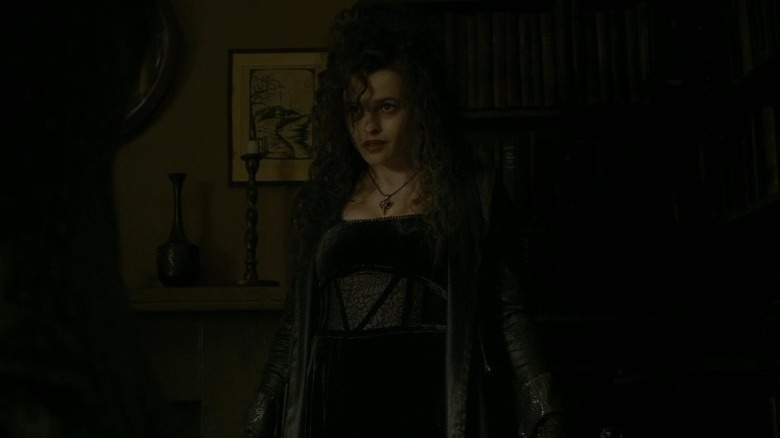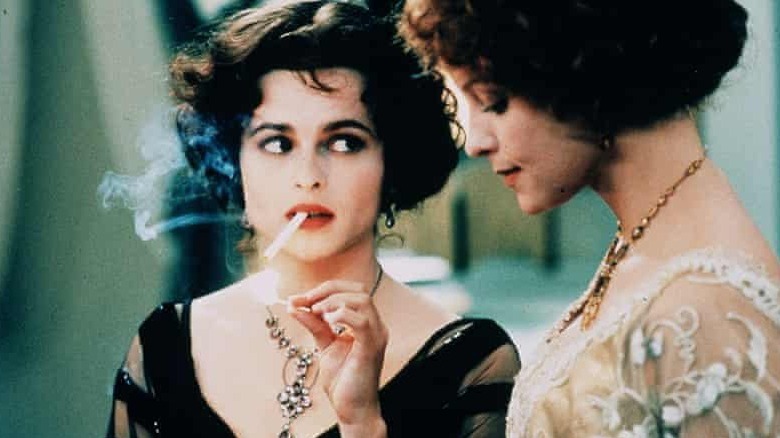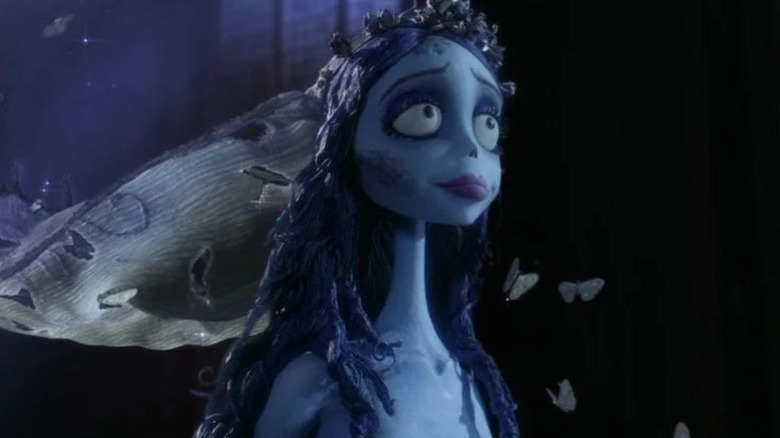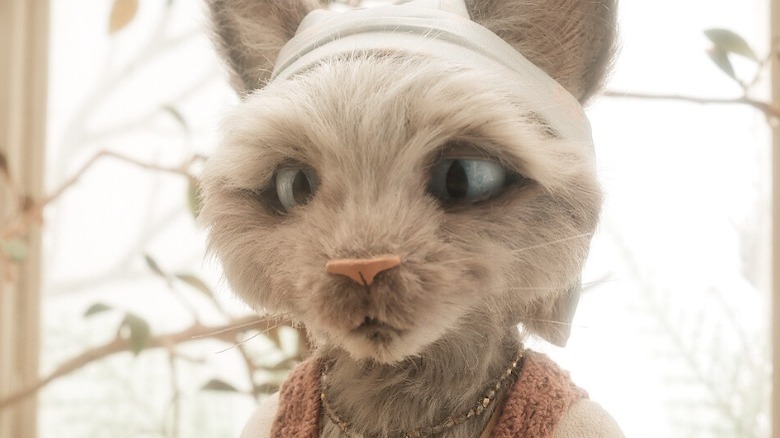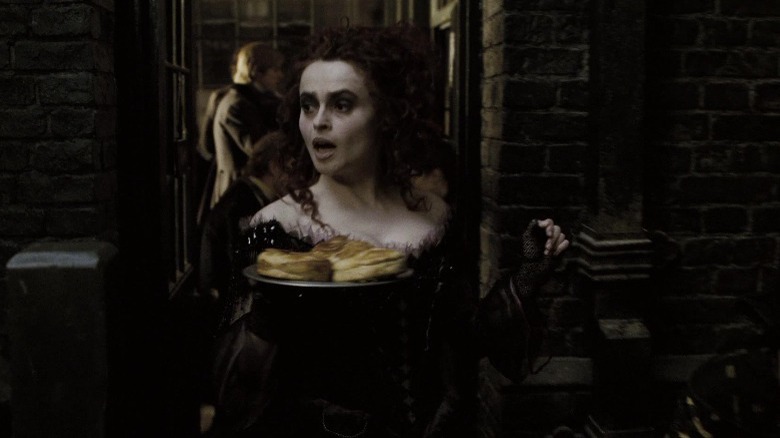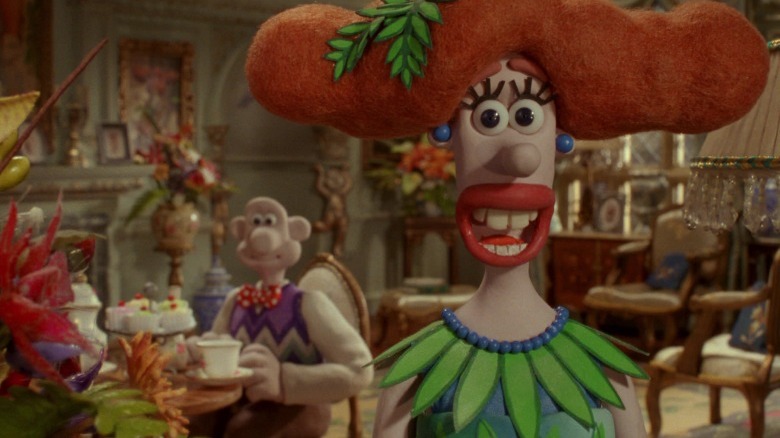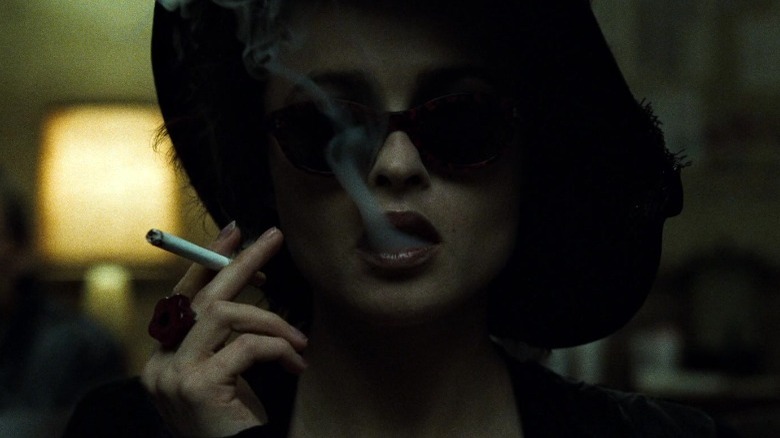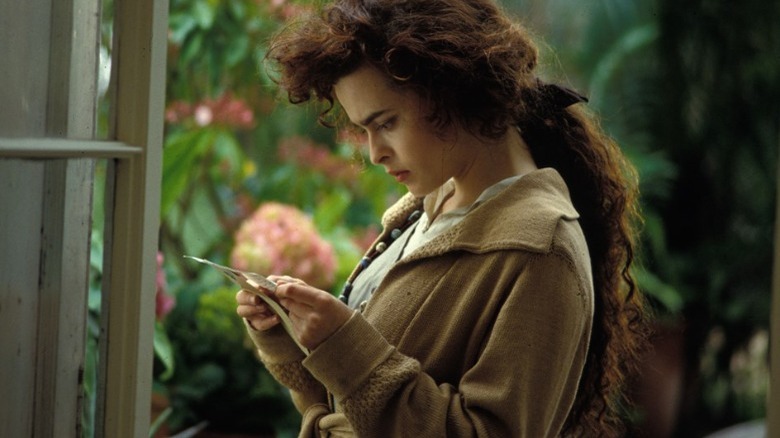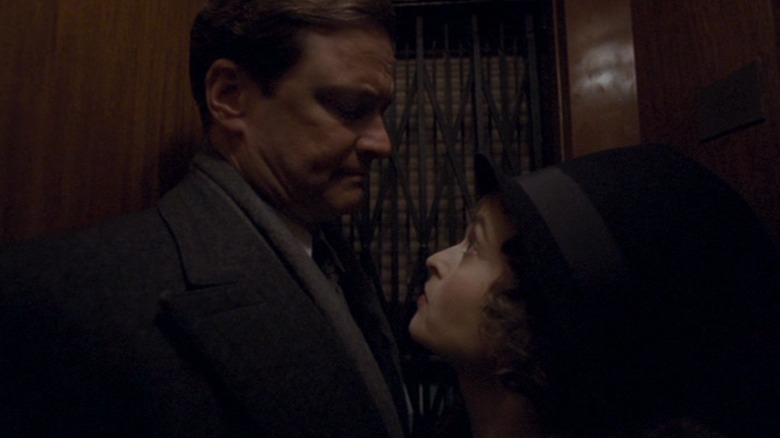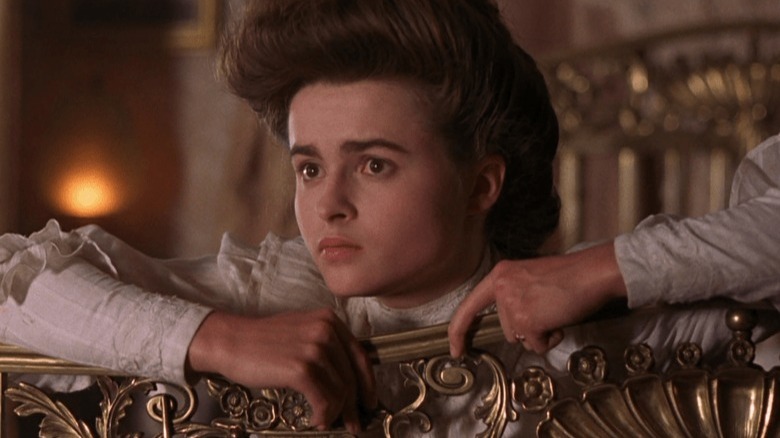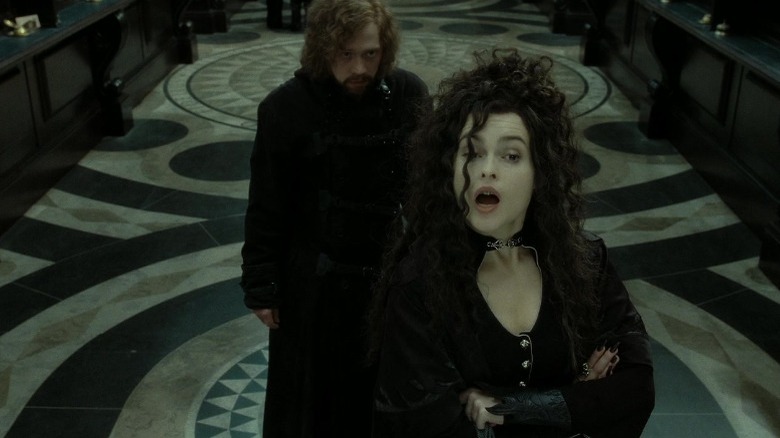Every Helena Bonham Carter Movie Ranked Worst To Best
What do you picture when you hear "Helena Bonham Carter"? Do you imagine a strong-willed and sophisticated girl in Edwardian times, rigidly corseted by society, just like her characters in "The Wings of the Dove" or "A Room with a View"? Or do you imagine a wild, eccentric, possibly unhinged woman, like the type she plays in "Harry Potter" and "Sweeney Todd"? Most of Bonham Carter's roles fall under one of those two camps. Bonham Carter is wicked good at playing those archetypes. In fact, many would argue that the above characters are some of her best work. But because she is so good at playing the Bellatrixes and Lucy Honeychurches, Bonham Carter sometimes gets typecast as the "Queen of the Period Picture" or "Kooky Gothic Witch." In actuality, Bonham Carter can and has played a wide range of characters throughout her career.
Let's take a look at the full spectrum of Helena Bonham Carter's work. We've compiled every single movie that Bonham Carter worked on, not counting TV shows, TV movies, and some of her more obscure voice-over work like "Carnivale" and "DragonHeart: Vengeance." Hopefully this compilation (which is ranked worst to best) will demonstrate what this talented actress is capable of.
48. Till Human Voices Wake Us
"Till Human Voices Wake Us" is easily Helena Bonham Carter's worst movie. In the film, psychiatrist Sam Franks (Guy Pearce) meets an amnesiac girl named Ruby (Bonham Carter). As it turns out, she is actually the ghost of a girl Sam loved who drowned when she was only a teenager. The problem: anyone can see this "big reveal" coming from a mile off. To the film's credit, the original Australian version kept its cards a bit closer to its chest. It showed the complete backstory with the drowned girl before jumping to the present. Yet the U.S. version alternates between the present narrative and flashbacks, making it painfully obvious where the movie is going right from the get-go, says Roger Ebert.
On top of everything else, Guy Pearce fails to convey any of his character's emotions, according to The Austin Chronicle, and the film's melodramatic lighting is atrocious—"even the shadows have shadows."
47. Alice Through the Looking Glass
Despite mixed reviews, Tim Burton's "Alice in Wonderland" brought in a lot of revenue, so Disney churned out a sequel that is almost universally despised. "Alice Through the Looking Glass" shows what happens when Alice returns to Underland and steals a time machine from Time (Sacha Baron Cohen) to help the Mad Hatter (Johnny Depp).
ScreenCrush concedes that Bonham Carter makes a good Red Queen, but adds that "her performance feels like a rehash from the first film." The same review argues that the movie can't seem to form a cohesive story or even justify why the first "Alice" needed a sequel. "The premise is so thin that it wears out its welcome before the first act is up," says The Chicago Tribune. Some viewers hoped that the change of directors from Tim Burton to James Bobin ("The Muppets") would make the sequel whimsical without being extravagant, but "Through the Looking Glass" is even gaudier than its predecessor.
46. The Lone Ranger
The 2013 version of "The Lone Ranger," an origin story for this Western hero (played by Armie Hammer), is generally considered a disaster.
Perhaps the filmmakers hoped they were righting some wrongs about the portrayal of Native Americans in Westerns, says NPR, but Johnny Depp's largely stereotypical performance as Tonto is still offensive. According to Three Rows Back, the movie has some serious tonal issues, switching from gritty violence to comic relief on the turn of a dime. The reviewer adds that the script restricts Helena Bonham Carter to a role (as peg-legged pimp Red Harrington) that doesn't give her a chance to shine. Variety describes Arnie Hammer's Ranger as a rather plain "vanilla protag," and adds that the crew behind this movie "builds things just to blow them up."
45. Terminator Salvation
The fourth "Terminator" movie depicts a post-apocalyptic world in which the AI Skynet has wiped out most of humanity, except for John Connor (Christian Bale) and his resistance. "Terminator Salvation" has some good action scenes, says The Times News, but that's about the only good thing the critics have to say about it. "Helena Bonham Carter is utterly wasted" in the role of Dr. Serena Kogan, says That Shelf, since she doesn't get a lot of screentime, and most of it is spent delivering exposition.
What's especially frustrating is that it could have been a better movie. Screen Rant points out that studio executives made the director cut some of Bonham Carter's scenes. She was originally the villain, but the execs made him change that, too. As the first human (or technically half-human) villain in the Terminator franchise, Bonham Carter would have made for a much more complex character.
44. Novocaine
Critics seem to all agree on one thing: "Novocaine" swings wildly between the genres of dark comedy and noir thriller, never seeming to settle on one or the other. A dentist named Frank (Steve Martin) has an affair with an attractive patient (Helena Bonham Carter) who takes advantage of him to obtain the drugs from his office and then frame him for murder. The problem, says Variety, is that the whole film "hinges on Frank's fatal attraction to Susan," but the movie never really shows us what he sees in her, because Bonham Carter plays her character as an unsavory con artist who is clearly up to no good.
The one highlight of this film is Kevin Bacon's character: an actor who is conducting research for his upcoming cop movie and interrogates Martin as if he's actually a cop (The Guardian).
43. Dark Shadows
In Tim Burton's "Dark Shadows," 18th-century aristocrat Barnabus Collins (Johnny Depp) sleeps with a woman named Angelique (Eva Green), who is actually a witch. She transforms him into a vampire and he wakes up two centuries later in 1972, where he discovers that his descendants are still affected by the witch's curse. Helena Bonham Carter plays the Collins family's psychiatrist, Dr. Hoffman. Vanity Fair insists this is a missed opportunity, since the role doesn't give Bonham Carter a chance to show her "usual flair for the perverse."
Collider says that all the characters (except for the seductive Angelique) are one-dimensional, and in fact Hoffman seems completely superfluous. The movie is "disastrously disorganized," according to Indiewire, juggling dozens of promising plot threads but never lingering on one long enough to actually go anywhere. Indiewire admits that even at his worst, Burton is still "a hell of a production designer."
42. Planet of the Apes
Tim Burton took the helm of this remake of the 1968 film, but after "Planet of the Apes" was poorly received, he told The Guardian he would "rather jump out the window" than direct a sequel. The general consensus: the movie's a hot mess. According to The Film Magazine, "Planet of the Apes" can't make up its mind and suffers from "studio interference," suggesting that the film might have been better if Burton had been given free rein. Still, the reviewer adds, it's got gorgeous production design and some excellent side characters.
Looking back at the film on its 20th anniversary, The Guardian said that Ari (the ape advocating for "human rights" played by Bonham Carter) is "sometimes plausible and touching, sometimes hilarious." They added that the film raises some intriguing questions with its clever allegory about animal rights, but that these weren't enough to compensate for a terrible story.
41. The Theory of Flight
In "The Theory of Flight," Bonham Carter stars as Jane, whose motor neurone disease confines her to a wheelchair. Jane makes it her goal to lose her virginity, with a little help from Richard (Kenneth Branagh), an eccentric artist obsessed with flying.
The Guardian says the film is somewhat well-meaning but mostly just condescending in its portrayal of a character in a wheelchair. Bonham Carter certainly makes a valiant effort to capture Jane's character. (Variety loved "her unique blend of kookiness and toughness.") But viewers can't help but wonder if the movie would have been more authentic and more moving if Jane had been played by an actress who used a wheelchair in real-life. Roger Ebert wrote that "Dance Me to My Song" is a film with a similar premise that does a much better job, in part because the writer and lead actress Heather Rose drew from her own experiences of being in a wheelchair.
40. The Heart of Me
"The Heart of Me" is a historical romance that follows the wealthy Dinah (Helena Bonham Carter) as she has an affair with her sister's husband in the years leading up to WWII. It's a rather stiff movie, says The Guardian, one that dwells too much in the characters' misery, though the actors certainly try their best in spite of their constraints.
"The Heart of Me" tries to channel the same type of character Bonham Carter played in period dramas like "Howards End" and "The Wings of the Dove," but unlike in those other films, says The New York Times, "her character is more infuriating than likable." In Dinah's defense, Roger Ebert says that she is "the kind of person it is easy to criticize until you look into her heart, and see with what fierce integrity she opposes the strictures of society."
39. Alice in Wonderland
When Tim Burton tried to reimagine Lewis Carroll's absurdist fairy tale as a dark fantasy, he ended up disappointing fans of both. According to The New Yorker, Lewis Carroll's wordplay got lost somewhere in translation, and even Roger Ebert, who loved Burton's take on Wonderland, was frustrated by the Hollywood-style action climax.
Without a doubt, the visual design of Burton's "Alice in Wonderland" is jaw-dropping, but the story has much to be desired. Film School Rejects said, "The film lacks a unique feel that shines through Burton's other work." This may have been because Burton felt pressure from studio execs to conform to a more Disney-like formula, speculated the East Bay Times. Still, many critics (including Film School Rejects) enjoyed Helena Bonham Carter's scene-stealing performance as the Red Queen.
38. Mary Shelley's Frankenstein
The plot of Kenneth Branagh's 1994 "Frankenstein" adaptation is closer to the original novel than the Boris Karloff film. In an attempt to play God, Victor Frankenstein (Kenneth Branagh) reanimates a dead body, but when he refuses to take responsibility for the creature (Robert De Niro), it goes on a destructive rampage. ReelViews argues that it's probably the "Frankenstein" movie closest in spirit to the original.
Does that mean it's a good movie? Not exactly. Rolling Stone says that De Niro is perfectly cast as the lonely monster, but adds that the movie gives a rushed treatment of Mary Shelley's complex themes. Sure, the film raises a lot of fascinating questions, but "Branagh rushes off to the next question before he has adequately addressed the present one." However, according to Entertainment Weekly, Bonham Carter brings a "fragile ... spookiness" to her character Elizabeth, especially in the scene where Victor attempts to resurrect her.
37. Ocean's 8
While "Ocean's Eight" certainly deserves credit for attempting an all-female version of the heist team from "Ocean's Eleven," the casting isn't enough to save this movie. According to Decider, some characters are given nothing to do, while others are so cool and collected that it's hard to connect with them—not to mention the movie's title gives away a major plot twist.
Slate points out that Helena Bonham Carter is playing a role that is significantly different from the wild and witchy stereotype she has so often played. Bonham Carter does a wonderful job playing Rose Weil, the washed-up fashion icon who tries to hide how desperate she is. The movie doesn't give her nearly enough development, says Slate, but "few can steal a scene half as well" as Bonham Carter. Perhaps viewers might even forgive her for her unconvincing Irish accent.
36. 55 Steps
Based on a true story, "55 Steps" is a legal drama about a patient with schizophrenia named Eleanor Reise (Bonham Carter) who goes to court against the hospital that gave her harmful medication without her consent.
The Huffington Post loved Bonham Carter's performance because she "doesn't play it for cute." Instead of just playing a sweet and innocent victim, she shows a wide range of emotions; her Eleanor is compassionate at some moments and obnoxious at others. However, The Hollywood Reporter argued that Bonham Carter is too over-the-top and her portrayal is disrespectful to the real-life Eleanor Reise. Most sources (including Variety) agree that the film is well-intentioned but too "on-the-nose" with its message.
35. The Revengers' Comedies
In this British comedy based on a play by the same name, two suicidal characters encounter each other at the top of a bridge and decide not to jump. Instead, Karen (Helena Bonham Carter) and Henry (Sam Neill) decide to get revenge on the people in their lives who drove them over the edge. Variety says Bonham Carter is great as the "quietly demented" Karen. AV Club, on the other hand, says that Bonham Carter's "behavior and motivation changes from scene to scene to suit the needs of the convoluted plot." Both reviews agree the play doesn't always translate well to the screen.
Of course, "The Revengers' Comedies" (released in the U.K. as "Sweet Revenge") will still probably appeal to black comedy fans. The movie is "a delicious example of British humor that manages to be both over the top and understated at the same time," says Flick Filosopher.
If you or anyone you know is having suicidal thoughts, please call the National Suicide Prevention Lifeline at 1-800-273-TALK (8255).
34. Portraits Chinois
"Portraits Chinois" is a French-language film whose title means "Shadow Play." Helena Bonham Carter plays fashion designer Ada, who becomes jealous when a girl named Lise (Romane Bohringer) gets the fashion gig Ada wanted and tries to steal Ada's boyfriend (Jean-Philippe Écoffey). Bonham Carter "doesn't come near [the] intensity" of her performance in "The Wings of the Dove," says Salon, but that's OK, because this is meant to be a lighthearted comedy. In fact, Salon adds that it's refreshing to glimpse Bonham Carter's comedic side, which was never given a chance to shine in her somewhat stuffy period dramas.
Still, the movie is not without flaws. The New York Times says the characters are too self-centered for viewers to really get invested in them. Meanwhile, Flick Philosopher says the film "starts to wander a bit aimlessly" in the middle, though it gets back on track by the end.
33. Charlie and the Chocolate Factory
Tim Burton directed this remake of the 1971 film "Willy Wonka and the Chocolate Factory." You know the story: Charlie Bucket (Freddie Highmore) wins a once-in-a-lifetime opportunity to tour the candy-making factory of the inscrutable Willy Wonka (Johnny Depp). Bonham Carter plays Charlie's mom, though the script doesn't give her much to do.
Most viewers agree that, despite the intriguing quirks of Johnny Depp's performance, his Wonka can't hold a candle to Gene Wilder's Wonka. Certainly, Tim Burton's interpretation of the story has its merits. The Austin Chronicle liked the Oompa Loompa songs better than the original and praised the "gob-stopping production design." Still, the 2005 film is missing something fundamental. The River Cities' Reader says that Burton's tone is much more detached than the 1971 film, and even though that is technically "truer to 'the spirit of Dahl,'" it also makes it hard to actually care about the characters.
32. Where Angels Fear to Tread
"Where Angels Fear to Tread" wasn't the first time Helena Bonham Carter acted in an adaptation of an E.M. Forster novel, and it wouldn't be the last, either. The movie is about wealthy English widow Lilia (Helen Mirren), who marries an Italian peasant (Giovanni Guidelli), outraging her uptight in-laws. Deseret loved Bonham Carter's performance as Caroline, "the repressed maiden caught in the middle" of the clash between Lilia and her in-laws.
Still, it's not a perfect adaptation. At times, it can feel like a "static succession of talking heads," Time Out says. Most sources agree that it can't compare to some of the other E.M. Forster adaptations that Bonham Carter starred in. (Roger Ebert said viewers would be better off watching "Howards End," which came out the same year.) But then, "Where Angels Fear to Tread" is "no slouch, either," according to The Austin Chronicle.
31. Great Expectations
This 2013 adaptation of the Charles Dickens novel is about a boy Pip (played by Toby and Jeremy Irvine) and his unrequited love for the girl Estella (Helena Barlow and Holliday Grainger). Helena Bonham Carter plays Estella's mother, Miss Havisham, who encourages Estella to toy with Pip because she is still bitter from her own broken heart.
The Guardian described Mike Newell's version of "Great Expectations" as "a watchable and accessible revival, though not groundbreaking." However, /Film conceded that Bonham Carter was perfectly cast, adding, "Who better to play one of the most iconic mad women of literature?"
30. Hamlet
Every actor does Shakespeare sooner or later, and Helena Bonham Carter is no exception. She played Ophelia in the 1990 adaptation of "Hamlet."
The Washington Post described the film as "a stripped-down, aerodynamic" take on Shakespeare. Franco Zeffirelli's "Hamlet" omitted quite a few subplots from the play, which makes the movie feel more immediate and accessible than most Shakespeare productions, even if it doesn't offer a particularly profound interpretation.
Roger Ebert points out that Bonham Carter faced an extra challenge, since after she descends into madness, Ophelia is often in her own little world and can't play off the other actors. But, he says, Bonham Carter achieves that beautifully. Her Ophelia is like, as The Washington Post put it, "a rag doll losing its stuffings."
29. Lady Jane
As Helena Bonham Carter's first screen role, "Lady Jane" paved the way for some of her most memorable parts. Helena plays Lady Jane Grey, the cousin of King Edward VI who was queen of England for only nine days. This historical romance pairs her up with Guildford Dudley (Cary Elwes).
Some reviewers loved the film's "old-fashioned, heart-tugging appeal" (The Los Angeles Times). Others balked at the glaring historical inaccuracies and felt that the film's attempts to tell an excessively romantic story didn't do the real-life Lady Jane justice (The Guardian). Still, Bonham Carter steps gracefully into the shoes of the 16th-century queen. "She especially nails the execution scene, where Jane struggles to find the execution block," says The Mary Sue. "Lady Jane" was Bonham Carter's big break, even if it did mean that she was consistently typecast as the same period-drama archetype for nearly a decade afterward (The Irish Times).
28. Women Talking Dirty
In "Women Talking Dirty," Helena Bonham Carter plays an exasperated single mother named Cora who renounces men and befriends a cartoonist named Ellen (Gina McKee). Jamie Russel from BBC loved the chemistry between Bonham Carter and McKee's characters and the film's realistic portrayal of a single mother, even if the movie's stakes didn't feel high enough. Russel said that right from the start it was obvious "a happy ending [was] destined for everyone involved." Meanwhile, Variety loved the hilarious scene where Cora gave birth, but felt that Bonham Carter's "determined kookiness" eventually grew tiresome.
The Guardian was disappointed that there actually wasn't much "talking dirty" in the film, at least after the cheeky discussion of masturbation in the opening scene. They felt that the director's previous film, "Stella Does Tricks," was much more "daring."
27. Suffragette
Sweatshop worker and loyal wife Maud (Carey Mulligan) accepts her lot in life at first, but she soon becomes involved in the early twentieth-century feminism movement in the movie "Suffragette." Bonham Carter's character Edith Ellyn is a "real firebrand" according to The Guardian, which praised the production design and said the film was "solidly researched and ... surprisingly grim."
"Suffragette" isn't afraid to depict the harsh realities of abuse towards women in the 1910s, says Indiewire, even if the film isn't exactly subtle when it makes all those things conveniently happen to the heroine at once. The film certainly does an admirable job of celebrating the suffragettes, even if it's a bit heavy-handed and misses an opportunity to explore "the rich complexity of reality," writes Sheila O'Malley for Roger Ebert. Indiewire concludes that Carey Mulligan's performance, if nothing else in the film, is delivered with amazing nuance.
26. Sixty Six
The British comedy "Sixty Six" is aptly named, because that's exactly what its Rotten Tomatoes audience score is. The plot: Bernie (Gregg Sulkin) is looking forward to celebrating his bar mitzvah, but it coincidentally falls on the same day as the World Cup Final in 1966, so his family ends up ignoring him.
Indiewire says that "Sixty Six" doesn't stand out very much from other films that belong to this particular niche of British coming-of-age comedies. Still, the Hollywood Reporter praises the film for its sly Jewish humor and its "portrayal of a neurotic but loving family."
While most critics felt that the best performances in the film came from Eddie Marsan and Stephen Rea, The Radio Times describes Helena's performance as a "revelation." Perhaps this is because Bonham Carter, the mother of a three-year-old at the time of its release, could relate to the character she played: a mother deciding she should probably pay a little more attention to her son (The Guardian).
25. Enola Holmes
"Enola Holmes" retells the story of Sherlock Holmes (Henry Cavill) from the perspective of his sister Enola (Millie Bobby Brown) as she attempts to solve the mysterious disappearance of her mother (Bonham Carter). Reviewers agree that it's a lighthearted but still smart movie with plenty of positive female role models. The way Enola constantly breaks the fourth wall is charming, if a bit distracting, according to Empire.
Helena Bonham Carter does a great job playing Enola's enthusiastic mother and teacher. Bonham Carter said in an exclusive interview, "It's actually funny, because [the original] Sherlock himself is quite misogynistic." Sir Arthur Conan Doyle would probably be rolling over in his grave if he knew about this new feminist take on Sherlock, and she loves it.
24. The Young and Prodigious T.S. Spivet
After his invention wins a prestigious contest, 10-year-old genius T.S. Spivet (Kyle Catlett) runs away from home and travels halfway across the country to accept his award.
According to The Young Folks, "Bonham Carter gives a controlled, emotionally humbled performance" as T.S. Spivet's insect-collecting mother; she still maintains a hint of her famous idiosyncrasies, but reins them in so they don't distract from the real star of the movie: T.S. The Guardian was impressed by the way Kyle Catlett "blends adult intelligence and childish innocence with ease."
Outside of the acting, "The Young and Prodigious T.S. Spivet" got a mixed reception. Indiewire praised the cinematography but described the film as "more twee than the Pinterest board for a Portland wedding." Yet Film Inquiry argued that it ought to be "counted amongst the best of children's films."
23. Mighty Aphrodite
"Mighty Aphrodite" is a Woody Allen comedy that alludes to Greek Mythology, complete with a Greek chorus that keeps butting in at all the wrong times, according to The Austin Chronicle. The movie follows Lenny (Woody Allen), who adopts a son in hopes of mending his marriage to Amanda (Helena Bonham Carter), before deciding that he wants to meet his son's birth mother. As it turns out, she is not at all what he is expecting: Linda (Mira Sorvino), is a cheerful and tactless sex worker who still radiates innocence in spite of everything she's seen.
Needless to say, Sorvino gives the most outstanding performance in this movie, offering a fresh take on the "sex worker" archetype. (Peterson Reviews says Sorvino saves what would have otherwise been a mediocre and problematic movie.) In comparison, Bonham Carter doesn't stand out as much. Still, this film is significant because it was one of the first times she stepped outside her period-drama comfort zone.
22. A Merry War
"A Merry War" (based on the George Orwell novel "Keep the Aspidistra Flying") is one of Bonham Carter's lesser-known films that can now be streamed on Amazon. It stars Richard E. Grant as a man in the Great Depression who quits his comfy advertising job so he can write poetry. His fiancée Rosemary (Bonham Carter) isn't sure how she should feel about that.
Due to the movie's dry humor, Roger Ebert said that it's not necessarily for everyone, but he certainly enjoyed it for its witty portrayal of a struggling artist. The film succeeds in walking the tightrope between satire and empathy, making it "worth two hours of your time despite its talkiness," The Austin Chronicle wrote. CNN praised Bonham Carter's performance, insisting she had greatly matured as an actress.
21. Les Misérables
In this movie adaptation of the Broadway musical, Jean Valjean (Hugh Jackman) plays a man who spent 19 years in prison for stealing a loaf of bread. Once he's released, he is determined to make the most of his second chance. Meanwhile, Helena Bonham Carter plays Madame Thénardier, a shameless con artist and the wife of an equally sleazy innkeeper (Sacha Baron Cohen). In an interview with Broadway World, Bonham Carter said that the Thénardiers have loads of fun, which she feels is noteworthy because "not many other people in 'Les Misérables' have fun."
The film overall got a mixed reception. ReelViews praised the care put into the set and costume design, as well as Hugh Jackman and Anne Hathaway's performances. The Slate agreed that Jackman was an amazing singer and actor, but added that the constant close-up shots of the actors were extremely distracting.
20. Sgt. Stubby: An American Hero
Loosely based on a true story, "Sgt. Stubby: An American Hero" is about a dog who earns a medal after following his master Robert (Logan Lerman) to the front lines during WWI. In a wise move, the animators avoid giving Stubby any humanoid mannerisms; instead, he acts just like a real dog (Variety).
The Hollywood Reporter points out that "Sgt. Stubby" includes a surprisingly realistic portrayal of war for a kid's movie. (It depicts trench warfare and mustard gas, and a comic relief character dies offscreen.) But Film School Rejects argues that the movie still ultimately glosses over the realities of WWI, and Inland 360 describes it as an "ultra-lightweight version of the tale that definitely deserves a heftier treatment."
Bonham Carter does an acceptable job as the narrator of the film, though it's a role that doesn't add much to the story (Common Sense Media).
19. Getting It Right
"Getting It Right" was the first time Bonham Carter was cast in a role that was drastically different from the Lady Jane archetype. In this film, a 31-year-old hairdresser (and virgin) named Gavin (Jesse Birdsall) crosses paths with three women: 40-year-old Joan (Lynn Redgrave), single mother Jenny (Jane Horrocks), and the unabashed Minerva (Bonham Carter). Helena Bonham Carter clearly relishes this role, dropping hilarious one-liners such as, "It's dirty to get into people's beds with your clothes on." (This she says while wearing nothing except a pouty expression on her face.)
The Radio Times described it as an "uneven comedy," but most other reviewers liked the film's idiosyncrasies. Roger Ebert pointed out that it's meant to be "a character film, not a plot film" and added that it "gives the characters the freedom to surprise us." All in all, "Getting It Right" strikes a nice balance between wit and sincerity, never "never slipping into parody or slapstick," according to Deseret.
18. Conversations with Other Women
The most distinguishing feature of "Conversations with Other Women" is that it's filmed entirely in split screen. One camera follows Helena Bonham Carter's character (known simply as "woman"), while the other follows Aaron Eckhart (whose character isn't given a name, either). The pair are former lovers who encounter each other at a wedding 20 years later and begin a one-night fling. Yet, unlike other films of this type, the two having sex doesn't mark the climax of the movie. It is just one event in a complicated night, which lends the film a nice level of maturity, according to The Village Voice.
Variety loved the film's nimble and flirty dialogue, saying that Bonham Carter was especially good at delivering one-liners with offhand nonchalance. Critics agree almost universally that the split screen is distracting. Still, David Thomson of The New Republic insists, "I liked the picture enough to forgive this failing."
17. Cinderella
Kenneth Branaugh directed this 2015 remake of the animated Disney classic. On the off chance that you aren't familiar with the plot, Cinderella (Lily James) is treated like a maid by her stepmother (Cate Blanchett), until she gets a chance to escape her terrible life when she meets a prince (Richard Madden). Helena Bonham Carter plays the Fairy Godmother, though she is "less fairy godmother than batty old aunt," according to The Guardian, who loved her offbeat take on the character.
USA Today loved the depth that Cate Blanchett added to the stepmother's character, though it was disappointed by the over-the-top performances by the two stepsisters. Meanwhile, Variety describes the film as "delightful if overly safe," adding that Blanchett is so perfect as the stepmother that you almost wish the film was about her instead of the less memorable Cinderella.
16. Margaret's Museum
"Margaret's Museum" depicts life in a Nova Scotian mining town, where Margaret (Bonham Carter) has already lost her father and one of her brothers to "the pit." Margaret falls in love with a bagpipe-playing miner named Neil (Clive Russell). Empire says that Helena Bonham Carter "delivers bucketloads of the required feistiness" for the heroine. Critics were also impressed by Neil's charm and the bitter wit of Margaret's mother (Kate Nelligan).
The film is a tragedy, but unlike other films that involve harsh mining conditions, this one is "quirkier and more eccentric," says Roger Ebert. (Case in point: Margaret's grandfather has black lung disease, so she casually thumps him on the back a few times each day to clear his airways.) Ebert concedes that the tragic ending may be easy to predict, but the film's power comes from "not its ending, but how it gets there."
15. Harry Potter and the Deathly Hallows: Part 1
In the penultimate installment of "Harry Potter," Harry (Daniel Radcliffe), Ron (Rupert Grint), and Hermoine (Emma Watson) begin hunting for the Horcruxes, their only chance of stopping Lord Voldemort (Ralph Fiennes). Here Bonham Carter returns as Voldemort's right-hand witch Bellatrix, "more deranged than ever" (The Denver Post). The race to obtain the Horcruxes may be a contrived plot device, according to Hollywood Chicago, but it's worth it because of the growth it brings out in the three main characters.
The Hollywood Reporter was unsure about the choice to split the final book into two movies. After all, there were plenty of moments from "The Deathly Hallows: Part 1" that could have seriously been shortened. Still, they admitted that it would have been difficult to try and squeeze everything into a single movie, adding that the slow pacing of "Part 1" would be forgivable if "The Deathly Hallows: Part 2" delivered a satisfying payoff. (Spoiler alert: it does.)
14. Big Fish
In Tim Burton's "Big Fish," Will (Billy Crudup) grows tired of the tall tales that his father Edward (Albert Finney) always tells about his youth and tries to find out how much of his father's stories are real when Edward is on his deathbed. Helena Bonham gets a cameo here in "a delightful turn as the one-eyed witch" (CNN).
Slant Magazine applauds the movie for being "sentimental but never manipulative." What I Watched Tonight was especially impressed by Finney's performance as Edward, who comes off as surprisingly lively and dynamic even though he spends most of the movie in bed. However, the reviewer pointed out that the visual effects seemed sub-par for a Burton film, even if that was only due to budgetary constraints. Then again, Movies in Focus argues that "Big Fish" is one of Tim Burton's best films because Burton's signature visual style is complemented by "smaller more intimate moments."
13. Twelfth Night
Shakespeare's "Twelfth Night" is the definitive love triangle. The widowed Olivia (Bonham Carter) falls in love with a "man" who is actually the girl Viola (Imogen Stubbs) in disguise. Meanwhile, Viola has a crush on Orsino (Toby Stephens), the man courting Olivia. The 1996 movie is a bit more serious than most adaptations of this Shakespeare comedy, but The Philadelphia Enquirer (via The Spokesman) says this is a nice change of pace since it means viewers can get more invested in each character's romantic longing.
Roger Ebert loved Bonham Carter's take on Olivia, saying, "She wisely plays the role sincerely, leaving the winks to the other characters." However, most critics agree that the real scene-stealer is Nigel Hawthorne as Malvolio, a servant who makes a fool of himself by courting Olivia.
12. Harry Potter and the Order of the Phoenix
Helena Bonham Carter's Bellatrix showed up late to the party, only crossing paths with Harry Potter nearly two hours into the film. But to compensate for her character's small role in "Harry Potter and the Order of the Phoenix," Bonham Carter decided, "I [want her] to be big." Never has a Harry Potter villain been so gleeful. Bellatrix is so sadistic she even makes Lucius Malfoy (Jason Isaacs) uncomfortable. Bonham Carter was so enthusiastic, she accidentally jabbed Matthew Lewis in the ear with her wand, she admitted in an interview with Entertainment Weekly.
As for the rest of the movie, it's much darker than the previous Harry Potter films, says Empire, but never unbearably so. Gone are the quidditch games and lighthearted magic; instead, Professor Umbridge (Imelda Staunton) runs the school with an iron fist. Many critics loved how director David Yates managed to turn the longest Harry Potter book into the second-shortest movie. The film "doesn't get bogged down in the interesting-but-so-what? details that have sometimes bogged down the earlier films" according to Jacksonville.
11. Harry Potter and the Half-Blood Prince
The sixth Harry Potter movie focuses on Harry's attempts to discover the secrets of Professor Slughorn (Jim Broadbent), as well as Malfoy's (Tom Felton) plot to eliminate the beloved Professor Dumbledore (Micheal Gambon). Helena Bonham Carter returns as Bellatrix, and once again she is, in the words of Den of Geek, "a perfect mix of fiendish kook, simmering mania and barely restrained violence." Den of Geek adds that the movie's ending is quite possibly the most emotional of any Harry Potter movie.
Top 10 Films appreciated the character development that comes from Harry, Ron, and Hermoine's romantic subplots, but felt that they sometimes distracted from the main storyline. Nonetheless, "Harry Potter and the Half-Blood Prince" is a satisfying installment because it knows to put the characters first and the magic second, according to The Pueblo Chieftain.
10. The Wings of the Dove
Helena Bonham Carter got her first Oscar nomination in "The Wings of the Dove." Bonham Carter plays Kate, who loves a boy named Merton (Linus Roache) but isn't allowed to marry him because he's penniless. She ropes in a terminally ill rich girl named Millie (Alison Elliott) to marry Merton, so he will inherit Millie's fortune after she dies and Kate will be free to marry him. To further complicate things, Millie falls in love with Merton.
Bonham Carter goes out of her way to make Kate a sympathetic character without trying to cover up her flaws (because boy, Kate is manipulative). "In lots of movies you know ... exactly who's the baddy and who's the goody," Helena told Indiewire, and she loves that "The Wings of the Dove" is not so simple. Salon says that Bonham Carter gave "multilayered performance that required her to play several conflicting emotions in almost every scene." Meanwhile, The New York Times called the film "magnificent," praising how the actors were able to communicate so much without even needing to speak.
9. Corpse Bride
Helena Bonham Carter participated in not one but three stop-action movies. The first of these was the macabre but charming "Corpse Bride." Victor (Johnny Depp) unwittingly proposes marriage to Bonham Carter's character (the titular corpse bride). The skeletal Emily has no body to dance with (sorry, we couldn't resist), so she wholeheartedly says yes. That's when she learns that Victor is already engaged to someone and the whole proposal was a misunderstanding.
There's something undeniably sweet about Emily, who remains cheerful even as her rotting body parts fall off. ReelViews adds, "She's not a cadaver to be trifled with." Her longing for Victor stems from her past abandonment, which adds a twinge of sadness to her actions. Bonham Carter portrays Emily with sincerity and empathy, says The Independent Critic, and our hearts ache for her when she finally decides to let Victor go.
8. The House
This stop-action anthology film on Netflix tells three creepy stories all set in the same house. First, an Edwardian-era girl and her family move into a new house that seems too good to be true. Next, a modern-day renovator struggles to contain a pest infestation. In the third segment (which Anna Menta from The Decider said "hit [her] the hardest"), an anthropomorphic cat (Susan Wokoma) becomes obsessed with attracting tenants to her house in a post-apocalyptic wasteland. Helena Bonham Carter plays Jen, a laid-back tenant who pays her rent in chakra crystals. Most critics agree she gave an outstanding performance.
Leisurebyte says "The House" is "more interested in its characters than its surroundings," which makes it deeper and more unsettling than most horror movies. The Miami Student even goes so far as to say it's one of the best Netflix-produced films to date.
7. Sweeney Todd: The Demon Barber of Fleet Street
Drawing inspiration from '30s-era black-and-white horror movies (Arts Fuse), Tim Burton designed the world of "Sweeney Todd" to be almost entirely black, white, and gray. (And red. Where would this slasher movie be without a little red?) After a cruel judge (Alan Rickman) unfairly sentences Benjamin Barker (Johnny Depp) to 15 years of exile, he returns and christens himself "Sweeney Todd" before carrying out a revenge plan that involves killing his enemies and baking them into meat pies.
The Independent Critic says Bonham Carter adds a lot of nuance to Mrs. Lovett, who goes along with Sweeney Todd's homicidal plans out of (unrequited) love for him. Meanwhile, Depp impressed audiences with his singing abilities, says The Boston Globe, though Bonham Carter's singing isn't quite as good. The Globe adds that the movie omits a few nice moments from the musical (including a song in which oblivious Londoners gobble up the aforementioned meat pies), but still it's a "bloody good" film.
6. Wallace and Gromit: The Curse of the Were-Rabbit
"Wallace & Gromit: The Curse of the Were-Rabbit" is a worthy follow-up to the original "Wallace & Gromit" shorts and a pitch-perfect parody of the horror genre. The plot is simple: the lovable idiot Wallace (Peter Sallis) and his faithful dog Gromit must stop the fuzzy beast that is terrorizing their town. In a stroke of comedic genius, directors Nick Park and Steve Box get to splatter their characters with "gore" in a G movie because the victims are all vegetables.
Reeling Reviews writes that Helena Bonham Carter "gives [Lady Tottingham] the right air of tweedy upper crust." Meanwhile, the animation of Gromit (the only sane character) is impeccable. Granted, the movie is not as tightly plotted as the original shorts, and the movie may have added some padding to get an 85-minute runtime. ReelViews says the story "falls a hair's breadth short of 'Chicken Run,'" Aardman's first feature film. Nonetheless, the movie is loads of fun.
5. Fight Club
In "Fight Club," an insomniac (Edward Norton) is so disillusioned by the mundanity of his life that he teams up with aggressive soap salesman Tyler Durden (Brad Pitt) to create the titular "fight club." While these two actors do an incredible job, Film For Thought argues that Helena Bonham Carter as Marla Singer is the most outstanding performance. She's "a live-wire of disruption," according to The Film Experience, and yet somehow "the only sane person in the narrative."
For the most part, critics agree that "Fight Club" is well-acted and well-crafted, though many are concerned by the film's implications. At a glance, the film seems to endorse Tyler's anarchic views. Roger Ebert says that "Fight Club" is likely meant to be critical of the nihilistic violence that Tyler Durden encourages, even as many viewers may miss that subtext and simply cheer on the fistfights. Returning to the movie with 20 years of perspective, The Guardian says the film is eerily prophetic and still definitely holds up.
4. Howards End
In this adaption of an E.M. Forster novel, two sisters' lives take very different turns. Margaret (Emma Thompson) marries the wealthy Mr. Wilcox (Anthony Hopkins) after his wife (Vanessa Redgrave) dies, while Helen (Bonham Carter) marries a financially struggling bank clerk (Samuel West).
GamesRadar says that Bonham Carter "brings life to a potentially stuffy flick." Bonham Carter herself said the story was "deeply soul-satisfying," and she loved the film's most bizarre and dramatic moments, like when Samuel West's character gets crushed by a bookshelf. Meanwhile, Redgrave made a huge impression with her brief cameo in the movie, according to The Hollywood Reporter, and Thompson was a perfect match for the strong-willed Margaret.
"Howards End" was nominated for nine Oscars and won three. Looking back at the film 25 years later, The Guardian said "Howards End" still "looks as handsome and high-minded as ever."
3. The King's Speech
In the hands of a different creative team, "A King's Speech" might have been a stuffy and pretentious drama. Instead, says Rolling Stone, it "digs vibrant human drama out of the dry dust of history." The story is quiet and deceptively simple: Colin Firth plays the stuttering King George VI (known to his family as "Bertie") as he trains with speech therapist Lionel Logue (Geoffrey Rush) so he can give a speech to his people.
Critics loved Firth's vulnerability and "poignant dignity" (Entertainment Weekly) as well as Rush's stubborn and witty performance as Lionel. Bonham Carter expertly slips into a role not quite like anything she has played before: Bertie's supportive wife, who is "a gentle ball of fire," in the words of Entertainment Weekly. The climax is "little more than a man trying to read several paragraphs over the radio" says Paste Magazine, and yet it's moving nonetheless.
2. A Room with a View
Adapted from the E.M. Forster novel by the same name, "A Room with a View" stars Bonham Carter as Lucy, a free-spirited girl constrained by Edwardian society. Bonham Carter wordlessly establishes exactly who her character is in the opening scene, according to The Film Experience, which is a testament to the talent of this actress, who was only nineteen at the time.
Roger Ebert declares, "It is an intellectual film, but intellectual about emotions," meaning that it challenges viewers to think about why the characters feel the way they do. "A Room with a View" has a critics' score of 100% on Rotten Tomatoes. The only reason we're not placing it at the top of this list is that the audience score is a more modest (but not too shabby) 85%, placing it just below a Helena Bonham Carter movie that has gotten even more universal acclaim.
1. Harry Potter and the Deathly Hallows: Part 2
Folks, it doesn't get much better than this. Even Dana Stevens of Slate, who admitted she hadn't read the books and wasn't a huge fantasy fan, was seriously impressed by "Harry Potter and the Deathly Hallows: Part 2." In the final chapter of Harry's story, he and his companions must defend their beloved school of magic against Voldemort.
Critics were awestruck by how David Yates' direction and Steve Kloves' script pulled together everything from the previous installments into a powerful conclusion. There are too many brilliant performances in this movie to name, but we'd like to give a special shout-out to the three leads as well as Alan Rickman as Snape; according to The Daily Bruin, "he brings more emotional weight to a single scene than many have in eight whole movies." Let's not forget Helena Bonham Carter. She had an extra challenge this time around: not only did she need to play Bellatrix but she also needed to be Hermoine disguised as Bellatrix. Slate credits Bonham Carter for this "wonderful piece of actorly sleight-of-hand," which is the cherry on top of what is arguably her most iconic movie role.
